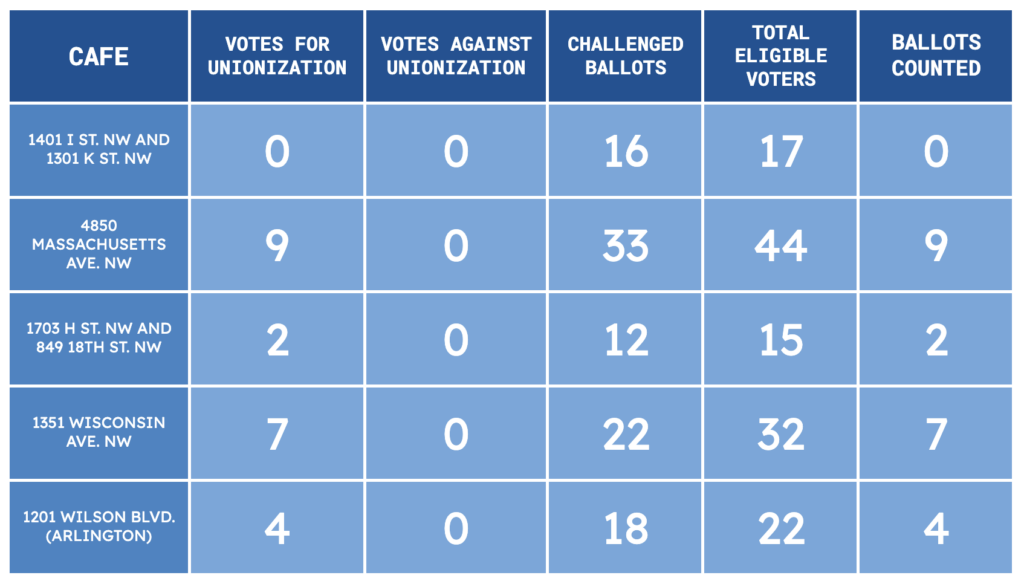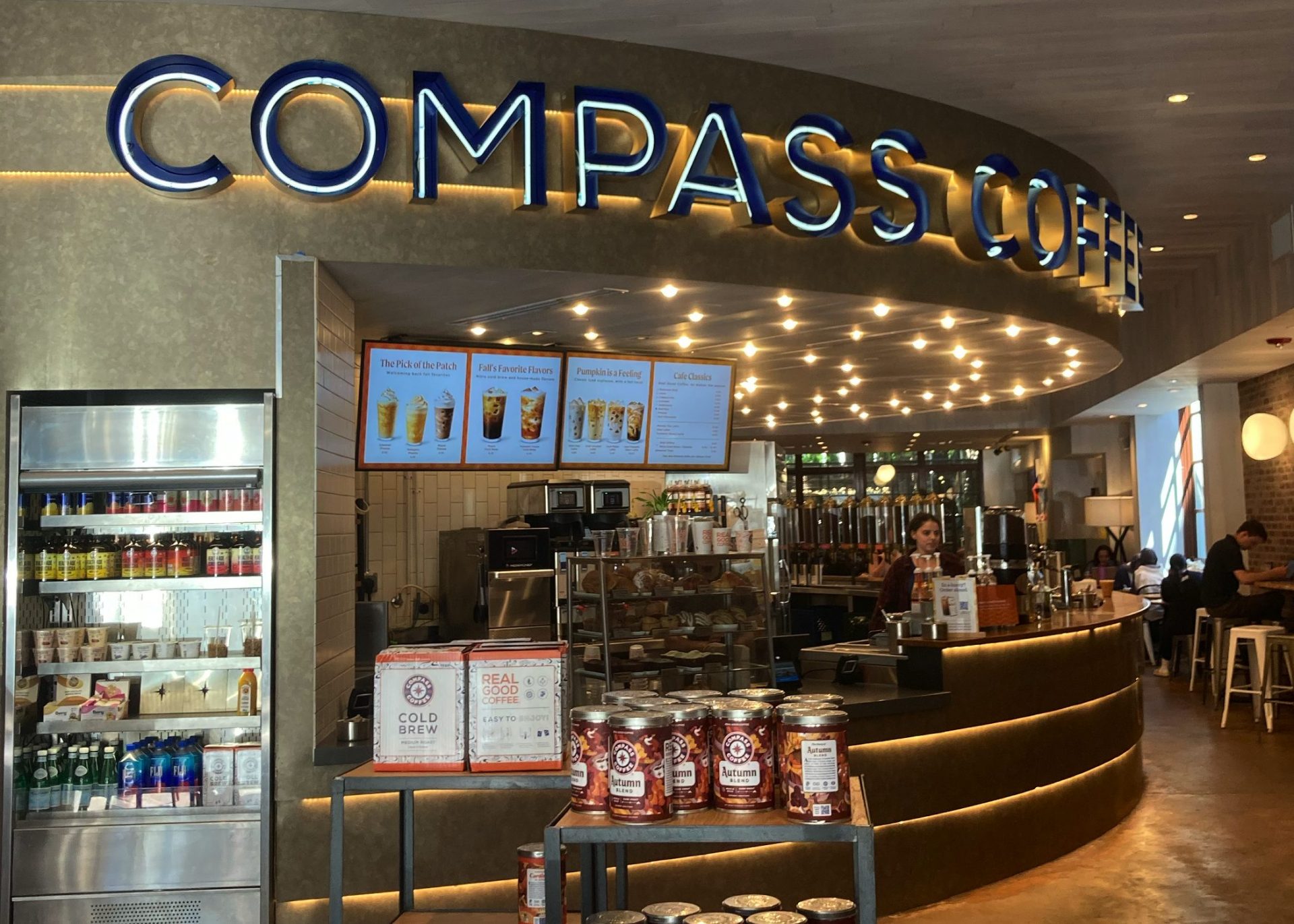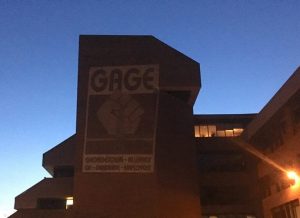While Georgetown students flock to Compass Coffee on Wisconsin Avenue for lattes and a dependably serene study spot, for Compass baristas, work has been anything but dependable or serene.
Compass workers at seven of their 17 storefronts, including the Georgetown location, voted in a National Labor Relations Board (NLRB) unionization election on July 16. Since then, workers and CEO Michael Haft have waited for the final vote tally, as it has been mired with ballot challenges.
Workers at Compass have alleged that prior to and after the vote, Haft and other managers tried to discourage and prevent unionization through a variety of tactics.
Haft did not respond to the Voice’s repeated calls and emails for an interview or comment.
Workers begin organizing
Workers at the petitioning cafés began to organize this spring, and officially announced their intention to unionize in late May. Reasons for unionizing ranged from maintenance concerns to demands for benefits, wage increases, and the reinstitution of iPad tipping.
Christopher Buchanan, who has been a barista and supervisor at the Georgetown location for three years, said that years-long maintenance concerns were resolved only after he and others announced their intentions to unionize.
Penina Meier-Silverman, who also works at the Georgetown location, told the Voice that maintenance issues impact both customers and baristas. She said that one of her coworkers at Compass’s Spring Valley location was electrocuted by the sandwich oven and was denied workers compensation because the coworker was not hospitalized.
“A lot of our maintenance concerns, like when it came to having mall bars or brewers working all the time, washing machines, dishwashers, I could go on and ad infinitum, they just weren’t being addressed or fixed in a timely fashion,” Buchanan said in an interview with the Voice.
Similarly, after the union went public, baristas received a 50 cent wage increase after having been denied one for the past five years, according to Buchanan.
Baristas report anti-union activity leading up to the vote
At the Georgetown location, the number of staff nearly tripled in the two weeks after workers went public with plans to unionize, Buchanan and Meier-Silverman told the Voice. In order to vote in the union election, employees don’t need to be full-time, but they need to work a minimum number of hours in the week leading up to the vote.
Buchanan found the influx of staff difficult.
“It’s very stressful, it’s packed behind the lines, so it’s hard for people to move around and stuff like that,” Buchanan said. “I think some of these hires are meant to sway the vote to a ‘no’ vote.”
According to reporting by The Guardian, multiple Compass employees accused Haft of hiring executives of D.C. chains as baristas, including Union Kitchen CEO Cullen Gilchrist, who himself has previously opposed unionization efforts. The Guardian also reported on tweets made by an Uber lobbyist who attended a new hire training at Compass and then was not scheduled to work a single shift this past summer.
According to Buchanan and Meier-Silverman, this mass hiring only occurred at unionizing cafés, and they think it was an effort by Haft to infuse the cafés with voters—many of whom had never worked as baristas—to oppose the union. They also both told the Voice that many of the executives hired at the Georgetown location were close friends of Haft’s or even family members.
However, not all the new hires seemed to be friends of the owner; others were students looking for a summer job, and some seemed to have no idea about Compass’s unionization efforts, Buchanan said.
Among this group of new hires, there were some who spoke little to no English. This language barrier was incredibly challenging for Meier-Silverman and Buchanan, who said that upper management failed to provide support to them or the new employees.
“It’s entirely the fault of the company for hiring these people and not providing proper translation services,” Meier-Silverman said. “We were just told to use Google Translate. We were even told to tell customers to use Google Translate, which is even more absurd.”
Jessica Hubbard, the former manager at the Georgetown location (who transitioned into a different role at Compass on Sept. 21), told the Voice that translated materials were emailed individually to employees who might need them.
Workers also told the Voice about being written up by their managers for discussing the union while at work. Being written up for discussing unionization is something that the NLRB classifies as an unfair labor practice if company policy doesn’t prohibit the discussion of nonwork topics—which Compass does not, according to all four employees the Voice spoke with.
Meier-Silverman received one of these write-ups because she was talking to a customer about the unionization effort.
“This was soon after we went public, so I had customers coming up and asking me questions. There was only one time during my shift where I went, ‘Hey, did you hear we’re unionizing?’ and that was to one of our everyday regulars,” she said. Meier-Silverman explained that, a day later, she got a message from her manager saying that someone in executive management wanted her to write Meier-Silverman up for “soliciting about the union to customers.”
But according to Meier-Silverman, she wasn’t soliciting, just answering customer questions, and even her manager at the time refused to write her up.
“It was very clear to me that they were lying, or if they weren’t lying, it was somebody close to Michael [Haft], and he was fabricating the situation,” she said. “My manager refused to write me up, and so they went over her head and Michael himself wrote me up.”
The vote
The fate of the Compass union has been in limbo since the union election was held in mid-July, as lawyers debate challenged ballots in front of the NLRB.
At each of the seven petitioning cafés, the vast majority of the ballots remain uncounted because they have been challenged by either side. In NLRB elections, ballots may be challenged if they believe that the employee is not a member of the bargaining unit or is ineligible to vote. In the Georgetown Compass election, 22 ballots were challenged of 29 who voted.
 Design by Cecilia Cassidy and Tina Solki
Design by Cecilia Cassidy and Tina Solki
Anti-union activity continues, according to baristas
Management’s tactics have shifted since the July 17 vote, but they have continued to discourage pro-union activity, according to Buchanan.
“I feel like they’ve changed their union busting tactics to just being insufferable,” Buchanan said. “The most recent thing they’ve been doing is scheduling people outside their availability.”
This practice puts employees who are scheduled for shifts they cannot work at risk of being written up. Buchanan has been routinely scheduled to work the opening shift, which starts at 5:30 a.m., despite living over an hour away from Georgetown in an area where the Metro doesn’t operate early in the morning. He has been able to find someone to cover those shifts, but feels as though he was purposefully put in a “‘damned if I do, damned if I don’t’ situation.”
The staffing of the café continues to fluctuate—according to Buchanan, the Georgetown location is understaffed once again—as many of the summer’s new hires left after the union election.
Some of those are students who went back to school, Buchanan said, but others just seemed to disappear.
“We had a few people who only showed up to vote, who I’d never seen before except to vote. And they’re no longer employed there,” Buchanan said. “We’ve had a few people who have coincidentally transitioned to more beneficial positions for them within the company.”
Among the employees that have stayed most are non-native English speakers and the language barrier, understaffing, and erratic schedules remain difficult for everyone at the Georgetown location, Buchanan said.
“There are still people with tenure who don’t get hours at all, while other people do get hours, and it’s causing a lot of frustration,” Buchanan said. “They’re doing that to try to divide and conquer and lower morale, and try to turn us against one another.”
Tatiyana Thompson loves connecting with her customers and creative practice of latte art. She’s also one of the employees who had her hours cut severely. Before June, she was a full-time barista at the Georgetown location. While she initially chose to cut back her hours a little in early June following a bad car accident, after she came back to work full-time Hubbard refused to put her on schedule, she said.
Thompson described how she would go back and forth with Hubbard asking for more hours given her seniority and status as a full-time employee; each time Hubbard would promise to fix her schedule and still Thompson would find herself with only one or two shifts of work.
“I went from working 30 to 40 hours a week to working four,” Thompson said. What Thompson found most frustrating is that Hubbard would tell Thompson that she wasn’t responsible for the scheduling.
“There were times that I would go to her and say, ‘Hey, my schedule is not looking right.’ And she’s telling me that, ‘Oh, I have no control over this schedule.’ And then next week she’s posting the schedule that she created, and I’m not on it,” Thompson said. Hubbard confirmed to the Voice that she was responsible for building the schedule at the café.
Eventually, Thompson began to notice a pattern in Hubbard’s scheduling—it seemed to disproportionately affect the employees of color, particularly the Black employees.
“At the time, I was the only Black woman in that café and there was only one other Black person, and he works in the evening time. His hours were affected too.” Thompson said. “She would either schedule him 10 days in a row with no day off or, like, not schedule him at all.” Hubbard denies any racial discrimination in scheduling and told the Voice that if baristas don’t update their availability in the scheduling system, they might be scheduled for shifts they can’t work.
Workers support each other
In the midst of turbulent working conditions and a long wait for the finalized union vote count, baristas have been trying to support each other. They’ve designated September as “Solidarity September” and have encouraged other labor groups and customers to show support.
Buchanan told the Voice that other unions in the area, including the Fairfax County Federation of Teachers, have delivered pro-union letters to management.
He also stressed the importance of customer support for the baristas. The organizing committee asked customers to show up on “Union Tuesdays” and order their drinks under the name “real good union” or other supportive messages.
“We encourage people to try adopting a café so they can come in and get to know the workers and constantly be a supportive force and boost the morale,” Buchanan said. “I think it really helps the baristas and also continues to put Compass on notice that, ‘Hey, what you’re doing is messed up.’”
With support from other organizations like Northern Virginia AFL-CIO, the organizing committee created a mutual aid fund that raised around $13,000 for baristas who’ve been wrongfully terminated or have had their hours cut.
For Thompson, the mutual aid fund has been an important source of support.
“You just fill the form out, let them know your situation and let them know the hours that you’re getting, the hours you’re supposed to be getting, and then they weigh each option, and then approve you for a certain amount,” she said. “So far I’ve been able to get almost $800, and it’s been a very big help.”
This solidarity has also allowed the organizing committee and pro-union baristas to maintain a united front. Thompson, Meier-Silverman, and Buchanan all told the Voice they remain steadfast in their belief in the union.
“I truly believe that if you thought you won, you wouldn’t be doing these things. They want to dilute our ability to negotiate once all this is said and done,” Buchanan said.







